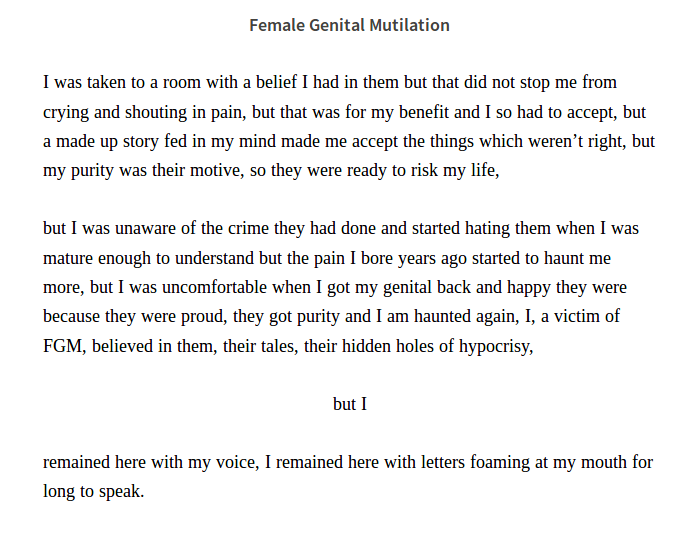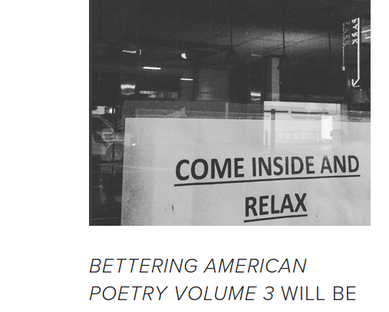The Quiet Letter is proud to nominate Indian poets for a poetry anthology. These poets were published in TQL’s editions in 2017. The poets are :
Sneha Dewani and Anushka Pandit.
This is an essay explaining the reason behind selecting them and their poems for the nomination process as Indian Poets writing in Indian English.
Sneha Dewani‘s poem Female Genital Mutilation, and Anushka Pandit’s The Question Before Arrival published in The Quiet Letter are nominated for the Bettering American Poetry as Indian Poets.
The poems selected here by TQL reflects thematic issues which concern the publishing guidelines of the editorial section headed by Pawan N Hira, founder and editor-in-chief at The Quiet Letter.

Coming back to Sneha Dewani’s poem, Female Genital Mutilation is a poem that speaks to many. It opens up the narrative of women and sexuality while the message of a haunting procedure crosses boundaries to touch the matter of prejudice and perversion of male gaze in the patriarchal world who want to achieve at any cost the deliberate silences of women and to play with sexuality is one such act that is beautifully penned with a beat-like pulse to it by Sneha Dewani, the young poet writing from Raipur, India who is also pursuing architecture degree currently.
This mutilation process of genitals is rooted in the practice of gender inequality and like common problems that are seen today of unequal pay between men and women, sexual and devious power politics in the name of fame by powerful males of such a system like the recent case of Harvey Weinstein in Hollywood which led to the rise of #MeToo campaign and which also picked a momentum later in the Berlinale 2018 where movies concerning the themes on the lines of the campaign issue were met with a mixed reaction in Germany along with issues of refugees and migration shown through movies. This clearly shows how convoluted social media campaign can become where participation on Internet does not result in actual solidarity with the campaign on real ground where gender inequality is practiced in day to day lives of women. The power play of fame and entertainment is a dynamic process where compromise is a given thing that leads to harassment and victimization, and this is obviously seen in two different thought streams, where one side supports the women who are coming from entertainment business and the other who reject the claim saying the picture is not one sided.
There is also harassment and consistent stereotypes of women as mere actors of home-chores to clean and dust each and every thing as if she were a machine multi-tasking and such a gaze is thrown at them consistently by the males who move outside in the world with buddies and plans. The poem, Female Genital Mutilation in such time is a reflection of the threat made to female sexuality which should be celebrated rather than to suffocate it and distort it through power dynamics of societal games because according to UNICEF in 2016 alone 200 million women living today in 30 countries—27 African countries, Indonesia, Iraqi Kurdistan and Yemen—have undergone the procedures. It is typically carried out by a traditional circumciser using a blade, and FGM is conducted from days after birth to puberty and beyond. In half the countries for which national figures are available, most girls are cut before the age of five as per the UNICEF reports recorded on Wikipedia. The poem is shown here:

The poem equally speaks of the horror of revisiting such a crucial moment later in teenage years when the poetess opens up her mouth foaming with letters to describe it and reaffirm the haunting memory that was unleashed on her without her consent during her childhood. It clearly speaks how the scar remains ever because of the notion of purity against sexuality where the former is always a thought rooted in middle-ages while sexuality is ignored and seen as deviant force rather than liberating force for women. If the first statue of woman Venus of Willendorf depicts exaggerated form of female, a mother goddess of fertility and if the liberating chronicles of Kamasutra and archaeological sites in India with caves carved show sexuality of men and women in ancient heritage, then sexuality as a thought of emancipatory force to open men and women equally is shunned and the brunt of it is mostly faced by women who are subject to the perverse gaze of male patriarchal world of objectification. Female Genital Mutilation as a poem opens that thought and does justice to what women go through in their lives in India especially where women are subjugated in homes and offices.
To select her and her poem for Bettering American Poetry as an Indian Poet, TQL is proud to have selected her as one of the contenders for the award apart from Anushka Pandit. Sneha Dewani’s poems are upcoming further in TQL this year which explore themes similar to this and with an aggression of a woman exploring the darkness of dominance and oppression by men.
Our second nomination, Anushka Pandit

and her poem furthers our notion to publish voices which matter. Her poem, The Question Before Arrival published in our August edition 2017 reflects a meta poem concerning silences and as an Indian poet, Anushka provides a brief exposure to what it means to look for hope amid darkness and as such she opens up threads of burden which one has to carry in the face of darkness while looking for light to arrive. The poem reproduced below shows the questioning power of the poet who opens up psychological dimensions to ask in probabilities of “maybe” as an uncertain gesture to prod the phase of darkness while leaving us in the end with a haunting question as if even the arrival as a woman would not bring an easy clarity into the mirror of self like the poem, Love after Love of Derek Walcott which describes the elation after struggle to meet the stranger back in the mirror. The ending lines of her poem reads as:
Do I have to take more
Some more pain and fear
It is a question that the young poet is keen to observe while building up the courage to face anything that would arrive because somewhere the poem reflects the life of shades we have to move through now and then. TQL selected three of her poems and this one reflects an Indian poet to establish her point of view while asking the question of what it means to arrive as a person, a poet in the world.

As a writer from Udaipur, India, Anushka works as the Community Head at Kalaage, a global platform built for writers to come and write together on one platform while engaging publishers and writers of many kinds in one thread which is showing its result in India as of now to bring Indian writers on the forefront. Anushka also handles the unit of Social Media as a Head at Ink Drift, a magazine prominently publishing diverse voices. The Quiet Letter is equally proud to carry her poems and to nominate her and her poem, The Question Before Arrival for Bettering American Poetry.
Now, the nominations for the selected poems and their authors are for:
Bettering American Poetry
Volume 3
What is it?
The Bettering American Poetry is an anthology based project which promotes writers and their craft while being keenly aware of contemporary world of arts and the practice of struggles that goes with it for voices which have a hard time to find a way in the mainstream locus of media arts. In their own words:
“The first Bettering American Poetry project was initiated by Amy King, who gathered together a group of poets with complementary yet distinct approaches to politics/poetics to serve as co-editors of the first anthology project. Bettering American Poetry 2015 was born out of both rage and hope, with an eye toward better publishing practices and the championing of vital artists. The three main curators of BAP are also connected in their individual capacity at Vida, women in literary arts, which is a non-profit feminist organization committed to creating transparency around the lack of gender parity in the literary landscape and to amplifying historically-marginalized voices, including people of color; writers with disabilities; and queer, trans and gender nonconforming individuals.”
Sarah Clark / Amy King / Héctor Ramírez



What they have to say about the nomination process also exemplifies their commitment to support individual and institution when selecting their roles:
“The BAP Series and its publisher, Bettering Books, curated by Sarah Clark, Amy King, and Héctor Ramírez. As curators of the series, Sarah, Amy, and Héctor supplement the selections made by editors where and if necessary (for instance, in the event that one editor cannot fulfill their duties, or if we simply feel the need to bring more underrepresented voices in the room). However, it is ultimately the role of each anthology’s editorial team to take charge of the content, shape, direction, and aspirations of their project however they see fit, beyond the general mission of the Bettering American Poetry Series.”
The co-editors of the previous Bettering anthology were contemporary poets who have solidified their voices as unique while allowing us to see the emergence of colored poets like a new renaissance slowly developing in our digital world of poetics and seeing them in the process earlier makes TQL happy to nominate Sneha Dewani and Anushka Pandit. The co-editors were:
Kaveh Akbar / jayy dodd / Joshua Jennifer Espinoza / Muriel Leung / Camille Rankine / Michael Wasson
Pawan NH, Editor in Chief @ The Quiet Letter
Poet and Novelist working with Gujarati
and English equally. His poems have appeared in
Kitaab, Parentheses Journal and elsewhere. His
two novels are in limbic space looking for a home
as he starts to work on another.

